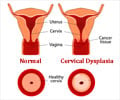Healthy women over the age of 30 who test negative for human papillomaviruses (HPV) results can safely wait for three years until their next set of gynecological exams, says study.

The study followed 331,818 women who enrolled in a northern California testing program by Kaiser Permanente between 2003 and 2005, and followed them for five years.
Among women who had a normal Pap smear and tested negative for HPV, which can cause cervical cancer, the five-year cancer risk was "very low: 2.3 per 100,000 women per year," it said.
During a Pap smear, which all women should get annually, a doctor collects a sample of tissue from the woman's cervix and sends it to a lab for examination and to check for any abnormal cells.
A separate test for HPV is also done during a woman's annual gynecological appointment. It often uses the same cell sample but looks specifically for signs of the virus.
HPV is sexually transmitted and most of the time the body can clear it on its own.
Advertisement
Women over 30 who test positive for HPV are usually retested in six months to see if the infection has cleared.
Advertisement
"These results also suggest that an HPV-negative test result alone could be enough to give a high level of security for extending the testing interval to every three years," said Katki.
More study is needed however to determine whether such recommendations should extend to the general population, the researchers noted.
"But we'll need additional evidence from routine clinical practice, and formal recommendations from guideline panels before that can be routinely recommended."
The Pap smear, invented in 1943, has reduced the number of cervical cancer cases but has not eliminated them -- some 11,000 women in the United States are diagnosed with cervical cancer each year.
Source-AFP















